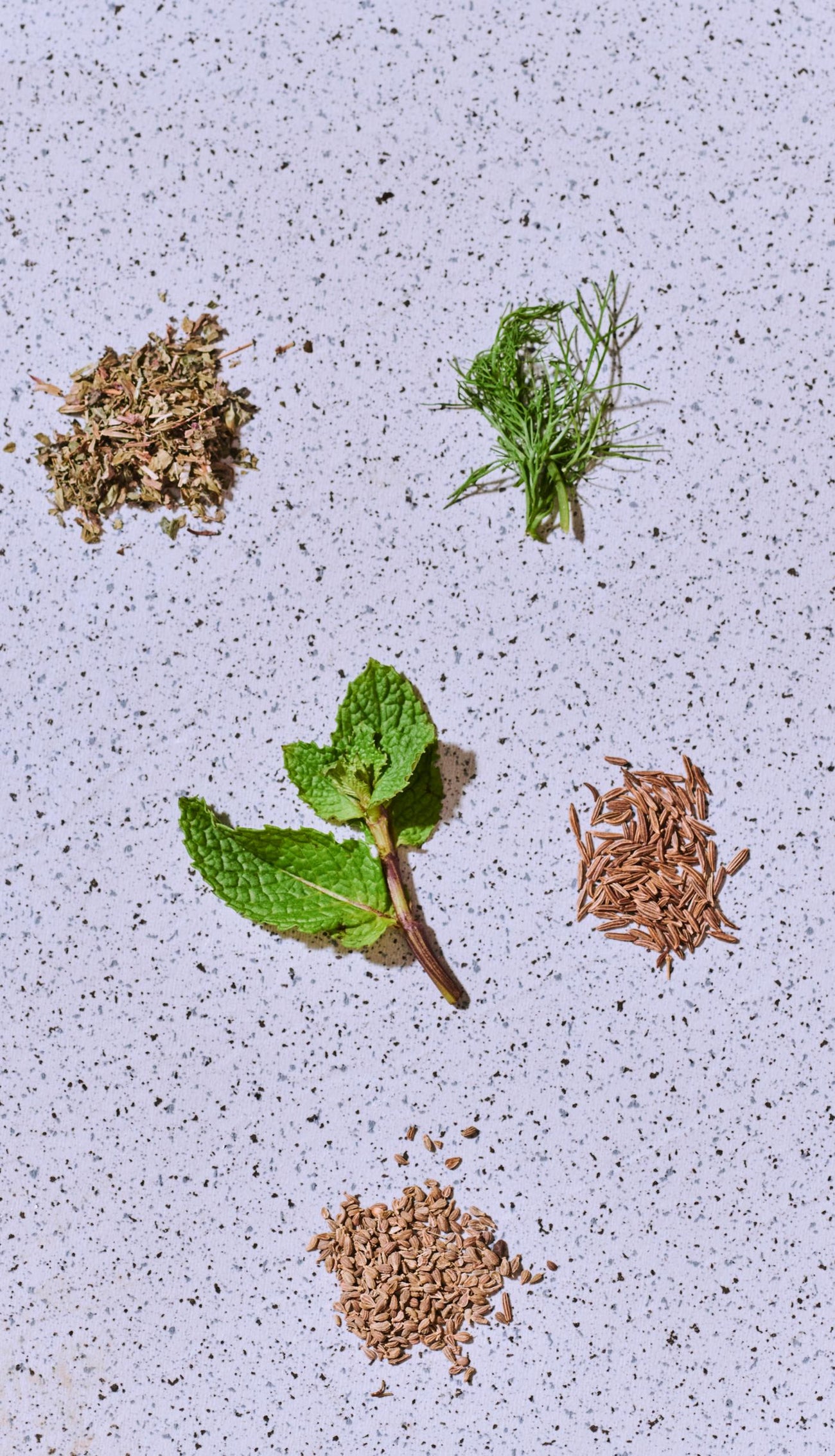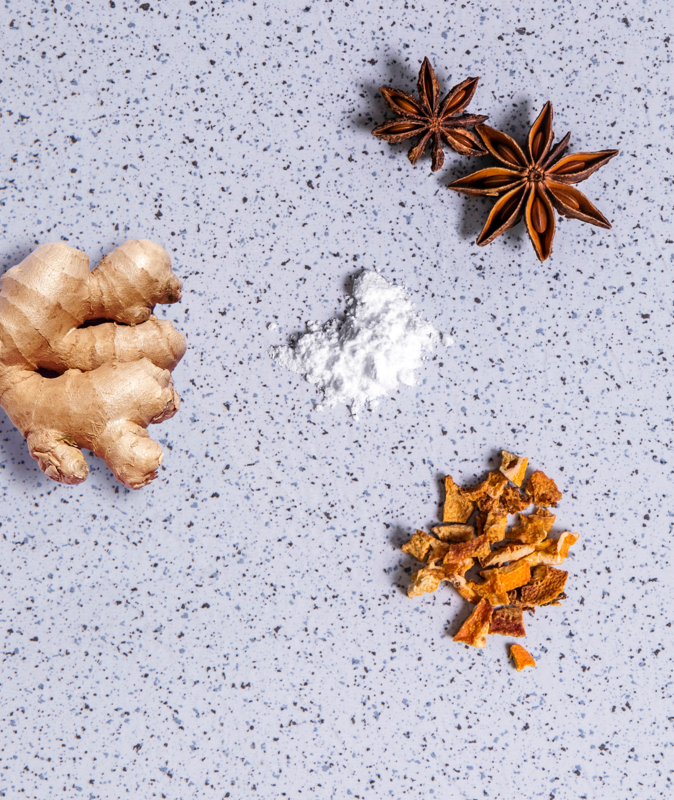
Whether it happens after a big meal or in our sleep, in the privacy of our bathrooms or in a muted (thankfully) yoga Zoom class — it happens to everyone. 5-15 times a day, in fact! Gas is normal — usually. We asked Hilma scientific advisor Paul Grewal, MD, an internal medicine physician and co-author of the New York Times best-selling book Genius Foods, to tell us what we should know about gas, and what it can tell you about your body.
The two main types of gas
"The first is stomach gas, which is mainly caused by swallowing air when eating or drinking. Most of this gas is released by burping," Dr. Grewal explains. This occurs even more so with carbonated beverages and chewing gum and the gas in the stomach (mainly nitrogen, oxygen, and carbon dioxide) exits up out through the esophagus, resulting in a burp. "The second type of gas, formed in your intestines, is caused by the bacteria in your colon digesting complex carbohydrates that your small intestine wasn’t able to process.” Foods high in fiber, sugars (like lactose and fructose) and complex carbohydrates often cause gas as they are broken down by gut bacteria. “The bacteria digest these undigested carbohydrates in a process called fermentation, which forms gasses (mainly hydrogen, methane, and carbon dioxide) as byproducts."
What foods cause gas?
Fiber and starch are complex carbohydrates that are primarily digested by the bacteria in your colon, Dr. Grewal explains, so foods like beans, fruits, vegetables, and whole grains will make you more gassy.
- Beans and legumes: Beans, lentils, and chickpeas contain complex carbohydrates and fibers that can be challenging to digest, leading to gas production.
- Cruciferous vegetables: Vegetables like broccoli, cauliflower, cabbage, Brussels sprouts, and kale are high in fiber and contain raffinose. Raffinose is a type of sugar that isn’t fully broken down in the stomach or small intestine. Instead, it reaches the large intestine, where gut bacteria ferment it, producing gas. Humans lack the enzyme alpha-galactosidase that is required to break down raffinose in the small intestine.
- Onions and Garlic: These contain fructans, a type of carbohydrate that can be challenging to digest. Some individuals may have fructan malabsorption, which means they are particularly sensitive to fructans and may experience gastrointestinal symptoms even with small amounts. This condition is more common in people with irritable bowel syndrome (IBS).
- High fructose corn syrup: High fructose corn syrup and even large amounts of fruits high in fructose, such as apples, mangoes, and cherries, can lead to bloating and gas when incompletely absorbed. Fructose is primarily absorbed in the small intestine through specific transporters. These transporters have a limited capacity that when overwhelmed, push unabsorbed fructose into the colon, producing gas.
- Artificial Sweeteners: Sugar alcohols like sorbitol, mannitol, and xylitol, often found in sugar-free candies and gum, can be difficult for the body to absorb fully, leading to gas.
- Starchy Foods: Potatoes, corn, noodles, and wheat are high in starches. These starches are made up of long chains of glucose molecules that require specific enzymes (amylases) to break them down. If these enzymes are insufficient or not functioning properly, digestion can be impaired.
But you don't have to cut down on favorite foods just because they produce more gas. "Occasionally, reducing meal frequency or short fasts to give the digestive system some time to rest and recover can prevent overfeeding the bacteria that cause these gasses," Dr. Grewal says.
How much gas is normal?
The average healthy individual passes gas 5-15 times a day. If you're passing gas 20 times, or more, a day, then you might have what's considered “flatulence”, which can be caused by digestive disorders. These disorders include celiac disease, Small Intestinal Bacterial Overgrowth (SIBO), pancreatic insufficiency, a gastrointestinal infection, amongst many others. Watch out for other symptoms too, like pain, constipation, and excessive bloating. "If your gas or any pain associated with bloating begin to interfere with daily life, it may be time to see a doctor who can evaluate you for more serious conditions," Dr. Grewal advises.
What causes gas to smell bad?
Let's just be real here — sometimes gas causes us (and any other poor souls in the room with us) to wonder what the heck we ate. And it could in fact be something you ate — simply eating high-fiber foods (which are very healthy!) can cause foul-smelling farts. Foods high in sulfur, like eggs, meat, onions, garlic, cabbage, broccoli, and cauliflower, contribute more sulfur to the digestive process, increasing the likelihood of smelly gas.Each person’s gut bacteria is different, so some people naturally produce more odorous gas than others. But so can eating something you have an intolerance to, so again, don't shy away from checking with your doc if you think something is wrong. Being constipated, taking certain medications, including antibiotics, and bacterial buildups in your digestive tract can also contribute.
Is it normal for gas to get worse during your period?
You’re not imagining it. Not only does water retention make us feel bloated during our periods, but our progesterone and estrogen hormones also create more gas in our small intestines. Your body is also busy releasing fatty acids called prostaglandins, which cause your uterus to contract and shed its lining. Prostaglandins are hormone-like substances that play a key role in the regulation of inflammation, blood flow, and the relaxation and contraction of smooth muscle tissue. They are the molecule responsible for menstrual cramps. If your body releases too many prostaglandins, they head over to hang out in your bowels, causing contractions — and therefore gas. As for that worsening of the smell? Changes in your gut bacteria caused by both hormones and hormonal changes in diet can increase sulfur in your gut, creating the “rotten egg” odor. Additionally, progesterone slows down the digestive tract, which can lead to bloating, gas buildup, and more time for food to ferment in the intestines, producing stronger-smelling gas. And lastly, period cravings often lead to eating more sugary, salty, or high-fat foods, which can contribute to gas production. Foods high in sugar or refined carbs, like chocolate or processed snacks, may increase fermentation in the gut and make gas smellier.
What is the difference between gas and burps?
Aging can also affect gas production. As we age, our digestive system can slow down, making it harder to digest certain foods efficiently. This slowdown, coupled with possible changes in gut bacteria and decreased enzyme production, can result in increased gas, bloating, and other digestive symptoms.
Lifestyle choices can significantly impact how much gas the body produces. For instance, people who exercise regularly often experience fewer digestive symptoms, as physical activity helps move gas through the intestines more efficiently. Conversely, stress and anxiety can contribute to bloating and gas by disrupting normal digestion. Practicing stress management techniques, like deep breathing or meditation, may be beneficial in reducing gas.
How to ease gas?
- Eat Slowly and Mindfully: Eating too quickly or talking while eating can lead to swallowing air, which increases gas. Take smaller bites, chew thoroughly, and avoid using straws or chewing gum. Dr. Grewal says. "To reduce burping during or after eating, your main focus should be on swallowing less air. Eating more slowly, not washing down food with liquids, avoiding hot beverages, and not drinking through straws will all help reduce the amount of gas trapped in your stomach during meals."
- Limit High-Gas Foods: Certain foods are notorious for causing gas, like beans, lentils, broccoli, cabbage, onions, carbonated drinks, and dairy products. If you are sensitive to these foods, take that into consideration. Reducing or cooking these foods can lessen gas production.
- Try Probiotics: Probiotics can help balance gut bacteria, potentially reducing gas. Foods like yogurt with live cultures, kefir, and probiotic supplements can be beneficial.
- Avoid Sugar Alcohols: Sugar substitutes like sorbitol, mannitol, and xylitol (found in sugar-free candies and gum) can cause gas because they aren’t fully absorbed by the digestive system.
- Stay Active: Regular physical activity can promote healthy digestion and reduce bloating and gas. Try a movement “snack” in between meals or an after-dinner walk to help move gas through the digestive tract.
- Keep a Food Diary: Track foods that may be causing excess gas to identify potential triggers, which can help you adjust your diet accordingly.
- Consider Lactase Supplements: If lactose intolerance is an issue, lactase supplements can help break down lactose and reduce gas from dairy products.
- Drink Herbal Teas: Certain herbal teas, like peppermint, ginger, or chamomile, may aid digestion and reduce bloating.
- Experiment with Portion Sizes: Large meals can overburden the digestive system, leading to more gas production. Eating smaller, more frequent meals might help.
And keep in mind, as Dr. Grewal says, "generating and passing gas is a normal part of healthy digestion." So next time you accidentally let one go in public, you can thank your body for the overeager reminder that it's just doing its best.
Interested in learning more about natural remedies for gas relief?
Read about carminative herbs, natural ways to reduce gas, and stretches for gas relief.
Note: This information is for educational purposes only, and should not be taken as medical advice. Please consult your physician before treating any disorder.
Sources:




